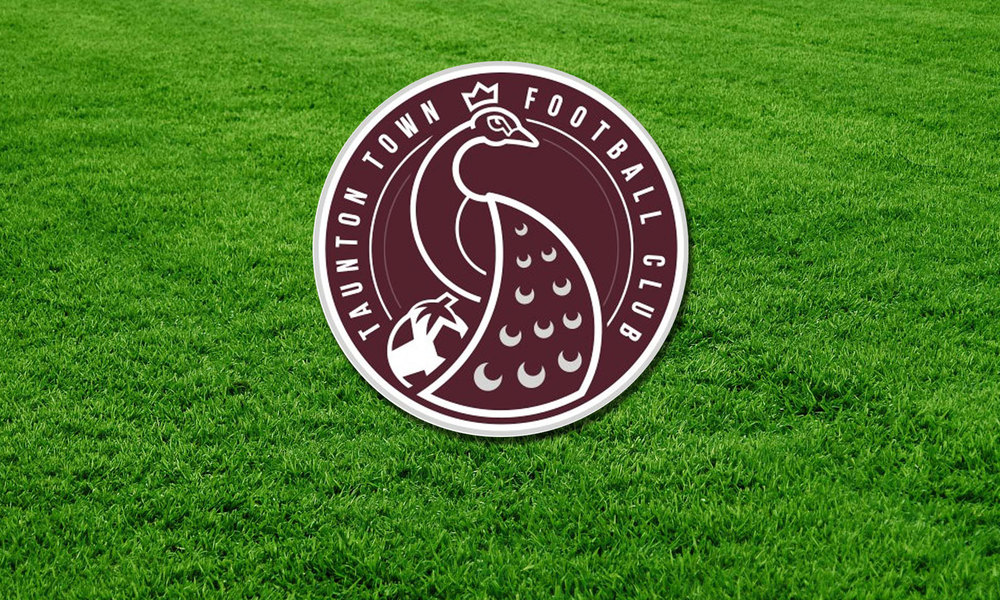
The present Taunton Town Football Club was formed in December 1947 by a few local businessmen and played their first friendly fixture during Easter 1948. They then played on a number of grounds such as Mountfields, French Weir, Victoria Park, Huish Old Boys and finished up at Denman’s Park, Haines Hill.
Having joined and played in the Somerset Senior League, 1953 became a notable year. The club gained admission into the Western League and moved into Wordsworth Drive, their present home.
The club struggled financially and depended heavily on a very active Supporters Club during the late 50s and early 60s. 1968/69 saw an upsurge in the club’s fortunes with manager Doug Hillard securing the Western League championship for the first time.
During the middle 1970s, Ron Gingell became manager and the club were runners-up for four consecutive seasons.
The 70s was also highlighted by the club purchasing the ground from Taunton Borough Council and the installation of floodlights.
During 1977 the club gained election to the Southern League.
The club became a limited company in 1981 and the new board soon decided that Southern League football was too expensive, and the club reverted to the Western League in 1983.
Seven years later the championship pennant returned to Wordsworth Drive under the management of Keith Bowker.
In 1994 the team then managed by Terry Rowles battled through to the FA Vase final at Wembley Stadium and took the lead, but Diss Town won the trophy in extra time.
Russell Musker was appointed manager in November 1994 and another championship followed in 1996.
After two seasons as runners-up three consecutive titles followed together with the club’s first-ever Cup success – a 2-1 victory over Berkhamsted Town in the FA Vase final at Aston Villa’s newly modernised Villa Park stadium.
This ended a sequence of 18 defeats in cup finals since the 1950s.
Another Cup victory was achieved in 2003, lifting the Somerset Premier Cup for the first time with a 2-1 win over Yeovil Town.
Peter Beadle took over as manager in 2005 but left after only 14 games to join Newport County and former Hallen manager Gary Domone stepped into the hot seat.
After a disappointing start, results began to improve, and the club won its second Somerset Premier Cup by beating Mangotsfield United.
Domone resigned as manager in December 2007 and was replaced by Ian Jones, who himself resigned in April 2009.
Former player Paul West, who lifted the Vase in 2001, took over and rebuilt the team with a local emphasis. West left the club in May 2012 and was replaced by Leigh Robinson.
The club has gone from strength to strength since then, reaching the Southern League play-offs in three successive years (2015 to 2017) as well as winning the Somerset Premier Cup in 2014, 2015 and 2017.
Season 2016/17 also saw the club reach the First Round of the FA Cup for only the second time in their history but after a 2-2 draw against National League side Barrow in front of a 2,300 crowd, the Peacocks had to make a long and arduous journey for the replay losing 2-1.
The 2017/18 campaign will rank as one the club’s finest ever as they won the West Division title by a massive 19 points to gain promotion to the Southern Premier for the first time in their history.
The team remained unbeaten away from home in all competitions throughout the season and only lost one league fixture after which they embarked on a 34-game unbeaten run in the league right up until the end of the season.
But, after two interrupted seasons due to the pandemic, Taunton surpassed the success of 2017/18 by winning the Premier Division South in 2021/22 by a five-point margin and gain a place in the National League South.
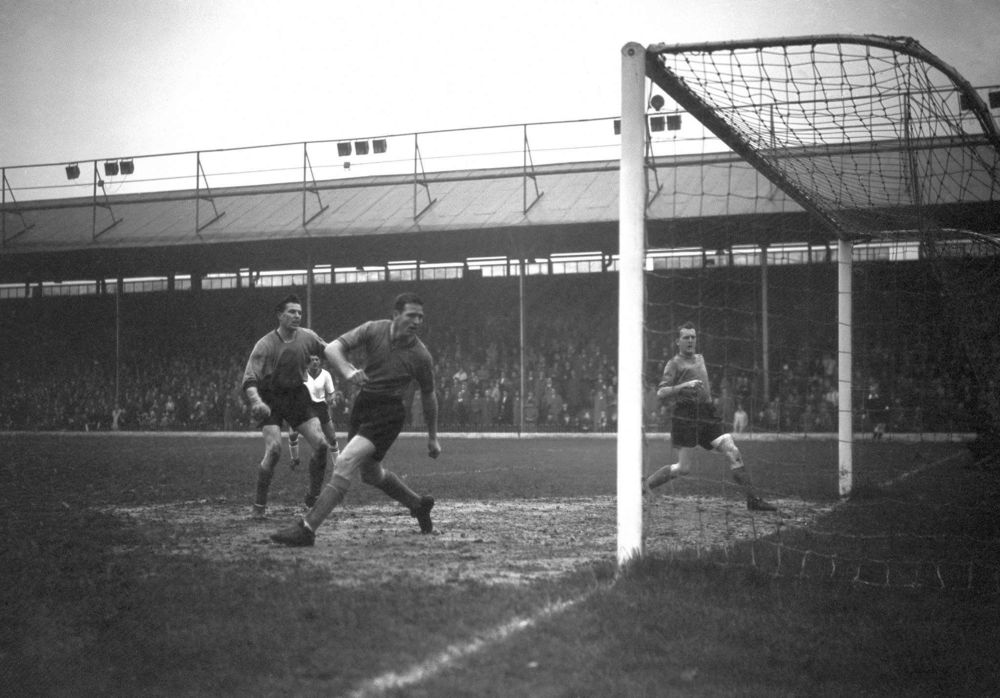
Gerry Cakebread
Goalkeeper Gerry Cakebread helped Taunton to win the Western League title in 1968/69 and spent three years with the Peacocks before having a short spell with league rivals and neighbours Barnstaple Town.
However, he is rather unique in that he played 348 times in the Third and Fourth Division for Brentford and never turned professional!
Indeed, during his National Service, he was preferred to future England international Eddie Hopkinson in goal for the Royal Air Force!
He had a run of 187 consecutive appearances for Brentford between November 1958 and March 1963 and won three England Youth international caps alongside Bobby Charlton and even as a part-timer he was twice called up for the England under-23 squad.
His playing career was curtailed somewhat by a nasty injury incurred whilst playing against Oxford United in March 1963 and the ensuing seven-month lay-off ended with his recall against Wrexham in October - the Bees edging home with a record 9-0 victory!
However, Cakebread played just 5 more games for Brentford that season before joining Southern League side Hillingdon Borough in 1965 and then Taunton.
Cakebread worked for the Admiralty during and after his football career as a draughtsman.
He was awarded an OBE in 1995 for his work on Hydro graphics at the Ministry of Defence.
Cakebread signed for Southern League First Division South side Minehead on a short-term emergency deal for the final game of the 1975/76 season at the age of 40.
Needing a draw against second-place Dartford to win the league title, Cakebread kept a clean sheet in a 2–0 win!
He died in Taunton in September 2009 after a long illness.
Alfie Biggs was a tall, strapping centre-forward, whose rumbustious style and never-say-die attitude epitomised Bristol Rovers’ halcyon days of the 1950s.
Like many in the great Rovers sides, Biggs was Bristol born and raised, and loyal to his hometown.
His debut for the club came against giants Manchester United in a friendly in 1953, and Biggs' performances in that same campaign played a big part in the Gas' ability to secure themselves in the second tier after promotion in the previous campaign.
Dubbed the 'Baron of Eastville', Biggs would go on to enjoy a successful 16-year career, becoming a notorious figure across the football pyramid, but predominantly with the Gas.
A tally of 178 league goals left Biggs placed second in the all-time league goalscorer charts for the Gas, behind Geoff Bradford.
The 30 league goals he scored in 1963/64 represent the most recent occasion any Rovers player has reached this seasonal landmark, although Rickie Lambert came very close in recent years.
Prised away from his adoring Rovers crowd at Eastville in 1961, Preston North End paid the handsome sum of £18,000 for his services.
A year later though, and after 49 games and 22 goals, Biggs completed a sensational return, labelled as a real coup for the club. However, despite being appointed club captain on his return, Biggs could not prevent his home-town club from being relegated back to third-tier football.
He left Rovers for good in 1968 after adding another 210 games and 101 goals to his tally.
He finished his professional playing days with spells at Walsall and Swansea Town before joining Taunton Town in 1969.
Upon his retirement from football, Biggs worked as a car salesman at Newton Cars and at Luton’s Car Sales. He also took positions as a postman, baker, and on the maintenance staff at Eastville. He later worked for a business parcel delivery service and, from 1997, as a security officer at Bristol University.
He sadly passed away in 2012, at the age of 76 in his family home in Poole, Dorset.
Ernie Peacock was a ball-winning wing-half who was all-action.
After the end of the Second World War – he `guested` for Bath City during the conflict - he was on the books at Notts County but returned to his hometown club Bristol to join City in 1946.
And he stayed for 13 years and made a total of 343 appearances for the Robins, scoring just 7 times.
He helped City win the old Third Division South in 1954/55 and after leaving Ashton Gate in 1959, he joined Southern League side Weymouth, playing 59 times until 1961 when he joined Taunton as player-manager.
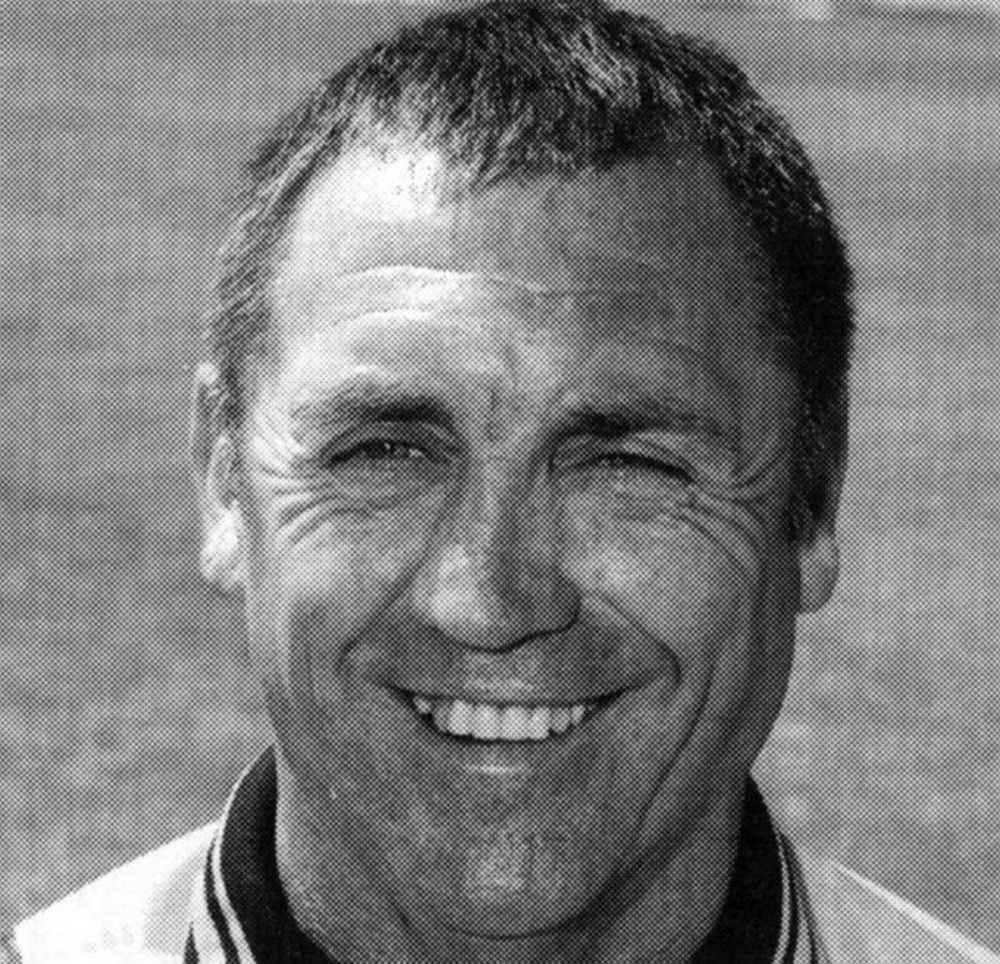
Terry Cotton
Terry Cotton, a former Welsh Amateur international originally with Llanelli, could play either centre-half or centre-forward.
He was a prolific scorer for Ammanford Town in the Welsh League before signing professional for Swansea Town in June 1968.
His solitary goal in 12 League outings came in Swansea's 4-1 defeat at Fulham in August 1970 and he joined Southern League Yeovil Town in July 1971.
He was top scorer in 1971/72 and featured in three Southern League Cup finals during two spells with the Glovers, making 441 appearances and scoring 83 goals.
In between spells at The Huish, Cotton followed former boss Mike Hughes to Southern League Salisbury and later turned out for Taunton and Bridport Town in the Western League.
After starting out as a police officer in the North-East, Ernie Price was spotted playing football by a talent scout and signed for Darlington.
His professional career then took him to Crystal Palace, Weymouth, Bideford and then Taunton as the club’s first player-manager in the 1950s.
He joined the Peacocks from Bideford in the autumn of 1954 and steered them to the runners-up spot in Western League Division Two in the 1955/56 season and went on to manage the Peacocks until he retired at the end of the 1960/61 campaign.
He returned as part of a three-man team that managed Taunton from the beginning of 1962 until the end of the following season.
He was also one of the first directors of the club when it became a limited company in 1981, and both his son John and grandson Jamie have gone on to wear the Town claret and blue.
Doug Hillard played as an amateur for Maywood, for whom he once scored 8 goals in a 15–0 victory over Lockleaze Rovers Juniors in 1952, and Bristol Mental Hospital.
He played over 300 games in an eleven-year period for Bristol Rovers - his only Football League club.
After leaving Bristol Rovers in 1968 Hillard joined Taunton as player-manager and found immediate success with the Somerset club, winning the team's first-ever Western League title in his first year in charge.
He remained in charge of Taunton for five seasons before being appointed manager of Mangotsfield United in 1973, a position he held for many years.
Before retiring from playing football Hillard opened a shop selling sporting goods, `Doug Hillard Sports`, which was originally located near Rovers' Eastville Stadium, but is now located in the Fishponds area of Bristol and under the management of his son Gary Hillard.
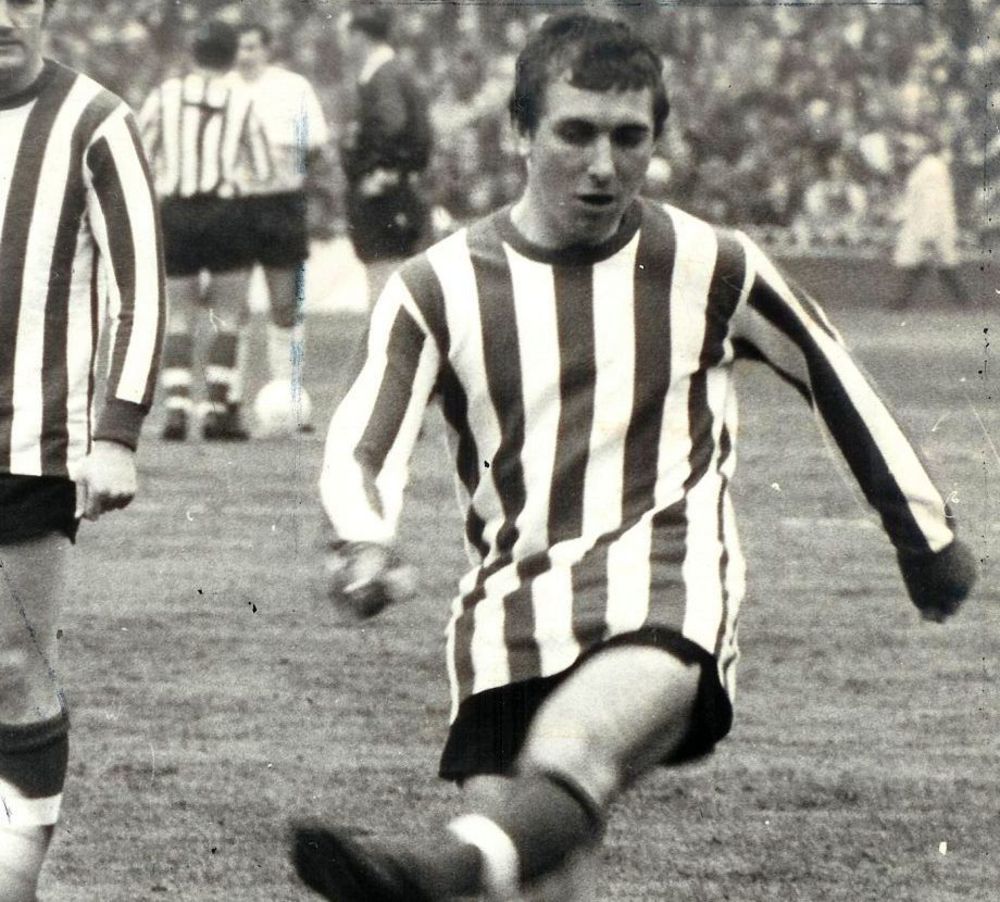
Brian O'Neil
Brian O’Neil hails from Bedlington in Northumberland and was spotted by legendary Geordie talent scout Jack Hixon, who, amongst others, uncovered Ralph Coates, Dave Thomas, Steve Bruce and Alan Shearer.
O’Neil signed for Burnley in 1961 despite interest from Arsenal and went onto win England under-23 and Football League honours.
He was in Alf Ramsey’s initial squad of 40 for the 1966 World Cup finals. But he lost out to Nobby Stiles as midfield-enforcer in the final 22.
In the mid-1960s, Burnley were a force who regularly qualified for European football and O’Neil had become a firm favourite at Turf Moor before becoming Southampton’s record signing of £75,000 in May 1970.
His ebullient character and terrier-like midfield play appealed to team-mates and supporters alike. Nicknamed ‘Buddha’, he was frequently in trouble with referees for his over zealousness and received several suspensions, including a spell of nine weeks in 1973.
Nevertheless, his resilience and energy were an inspiration to others, and he always played the game with a smile – shirt hanging out and socks rolled down. Team-mates were always on the lookout for him as it was alleged that he never owned his own boots and would steal theirs. He had a thunderous shot and if that didn’t succeed, Mick Channon or Bobby Stokes were always on hand to snap up the rebounds.
O’Neil adored his manager, Ted Bates, and he would carry out his instructions to the letter. During one particular pre-match team talk at Bramall Lane, Bates was expressing how influential Sheffield United’s new star, Tony Currie, was proving to be. ‘Look after him’, Bates instructed O’Neil. Two minutes into the game, Currie was flat on his back following a ferocious O’Neil challenge. He looked across to the dug-out to see Ted Bates standing up with a beaming smile and thumbs up!
However, Lawrie McMenemy was a different story who on taking over soon looked to overhaul the squad; It was no secret he and Lawrie's temperaments clashed.
O’Neil was one of many of the early 1970’s team to move on. Third Division Huddersfield Town snapped him up for a fee of £40,000 and he was immediately appointed skipper.
O’Neil spent two seasons at Leeds Road before moving to Devon as player-manager at Western League side Bideford, despite offers to join Jimmy Gabriel in the North American League with Seattle Sounders.
On leaving O’Neil took up a playing role with Taunton which he combined with working in the building trade.
Arnold Mitchell is Exeter City’s record appearance holder.
Rotherham-born Mitchell’s football career started at Sheffield Wednesday and he went on to Derby County and Nottingham Forest before joining Notts County in 1951. However, it was only after he joined the Grecians that his career really took off.
After signing from Notts County, Mitchell made his debut for the Grecians in 1952 and served for 14 years.
He made 38 appearances in his first season at St James’ Park and in 1954, he spent 11 minutes playing in goal in a goalless draw at Southend United after regular ‘keeper Geoff Morton was injured.
Mitchell was noted for his drive and encouragement of team-mates and recovered from a serious knee injury in his tenth season and captained the Exeter team that won promotion for the first time in the club's history in 1964, when he netted 3 goals in 38 league starts.
His 516 appearances remain a club record and, in that time, he scored 46 goals for the club and had the distinction of playing in every position. He captained the Grecians to promotion in 1963/64.
Despite his sterling service to the club, Mitchell was never given a testimonial by the Grecians, although he was granted freedom of the City of Exeter later.
He ended his City career in 1966 and played a season or so with Taunton before a broken fibula forced him to call it a day.
After retirement, Mitchell continued to live in Exeter and became a very accomplished golfer.
Cliff Myers was a South Londoner, and as a Charlton Athletic youngster he made 18 appearances before following manager Ron Saunders to Brentford.
Myers soon travelled south to sign for Southern League side Yeovil Town and under manager Mike Hughes he amassed 328 games and scored 81 goals, before being prised away by Torquay United for a fee of £6,500.
The catalyst for the move was Hughes, who had then moved to Plainmoor to become Malcolm Musgrove’s assistant.
Myers went on to make 93 appearances for the Gulls, scoring 12 goals as a silky midfielder with an eye for goal, before retiring from professional football and setting up his own cleaning business locally.
In 1975, he signed for Southern League Weymouth, but played only half-a-dozen times before joining Taunton.
He had two more spells back in the Southern League with Salisbury and Minehead before calling it a day.
In 1991, Cliff emigrated to Rhodes with wife Rene where they opened a bar in the resort of Lindos, where he sadly passed away at the age of 72 in February 2019.
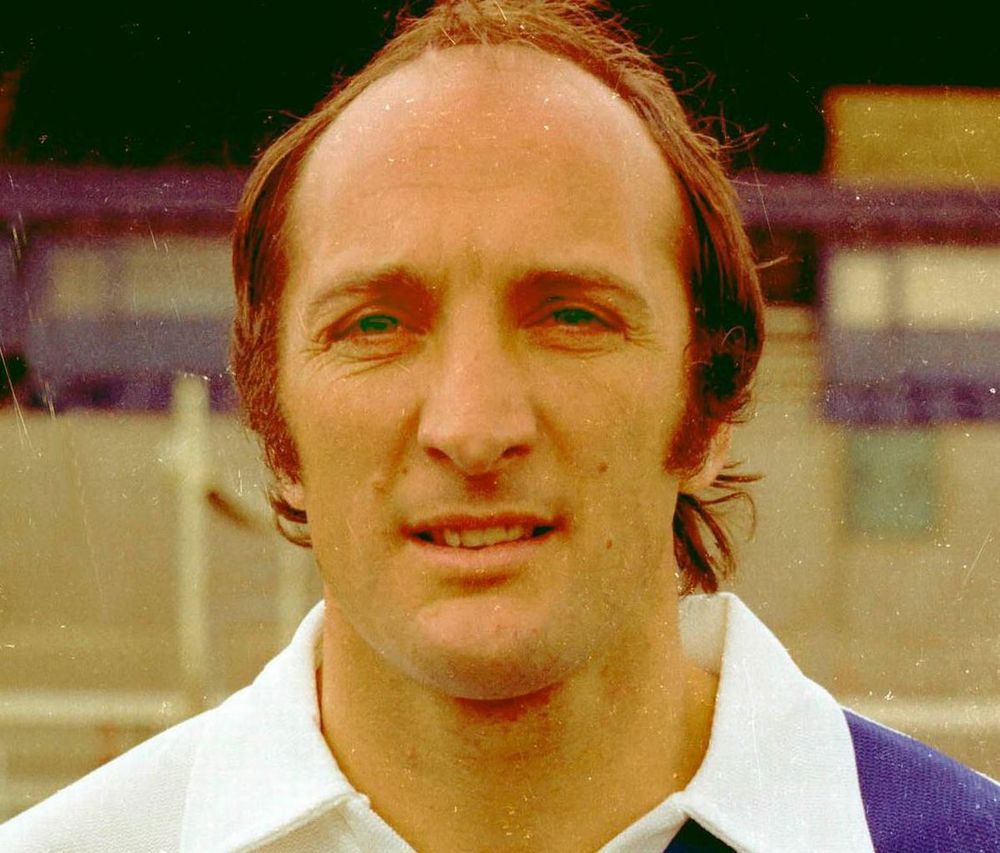
Lindsay Parsons
Full back Lindsay Parsons was born in Bristol and signed his first professional contract with Rovers in March 1964, on his 18th birthday.
By the time he left the club, in July 1977, he had appeared in 360 League games - a total that included one run of 167 consecutive appearances.
A member of the side that won the Watney Cup in 1972 and promotion to the Second Division in 1974, the right-footed left-back never though managed to get his name on the scoresheet for Rovers.
He more than made up for his lack of goals with his consistent defensive displays in a blue and white quartered shirt, though, and his no-nonsense defending and goalline clearances were often the talk of the Eastville terraces.
He was awarded a testimonial season in 1974/75.
In the 1976/77 season, his last at Eastville, Lindsay skippered the side and appeared in 26 games.
He moved on to Torquay United after leaving Rovers in the summer of 1977 and played 56 games for the Plainmoor outfit before embarking on a non-League career with Cheltenham Town, Taunton, Gloucester City, Forest Green Rovers, Yate Town, Hanham Athletic and Frome Town.
He was also a schoolboy coach at Rovers between 1983 and 1988 and in November 1990 he returned to Whaddon Road to take on coaching duties for Cheltenham Town.
He became caretaker manager in 1992 and later that same year took on the role in a permanent capacity, with former team-mate Peter Aitken as his assistant.
In 1995 he joined another former Rovers team-mate, Tony Pulis, who was then manager of Gillingham and the two of them went on to work together at Bristol City, Portsmouth, Stoke City, Plymouth Argyle and Stoke City again.
He died in April 2019, aged 73.
Despite playing for Bristol Schoolboys and the England Youth side,
An attacking midfielder, he established a reputation as an extremely skilful player and was also renowned for his ball-juggling skills - he even succeeded in a national newspaper competition to find the player who could achieve the most consecutive headers (Burnside won with 495).
Moving on after five years at The Hawthorns, he spent two years each with Southampton, Crystal Palace and Wolverhampton Wanderers before joining Plymouth Argyle in 1968.
A change of position to centre-forward led to Burnside winning the player of the year award in his first full season with Argyle, but he could not keep up this form and lost his place the following year.
Reverting to midfield, he played regularly in 1970/71, but when he found himself back in the reserves the following season, chose to transfer to Bristol City.
This move lasted just three months and one appearance, and after spending the remainder of the season with Colchester United, Burnside retired.
He had totalled over 400 League appearances and scored 80 goals.
He went on to play non-League football as player-manager at Bath City and also as player-coach for Minehead, Bridgwater Town and Taunton.
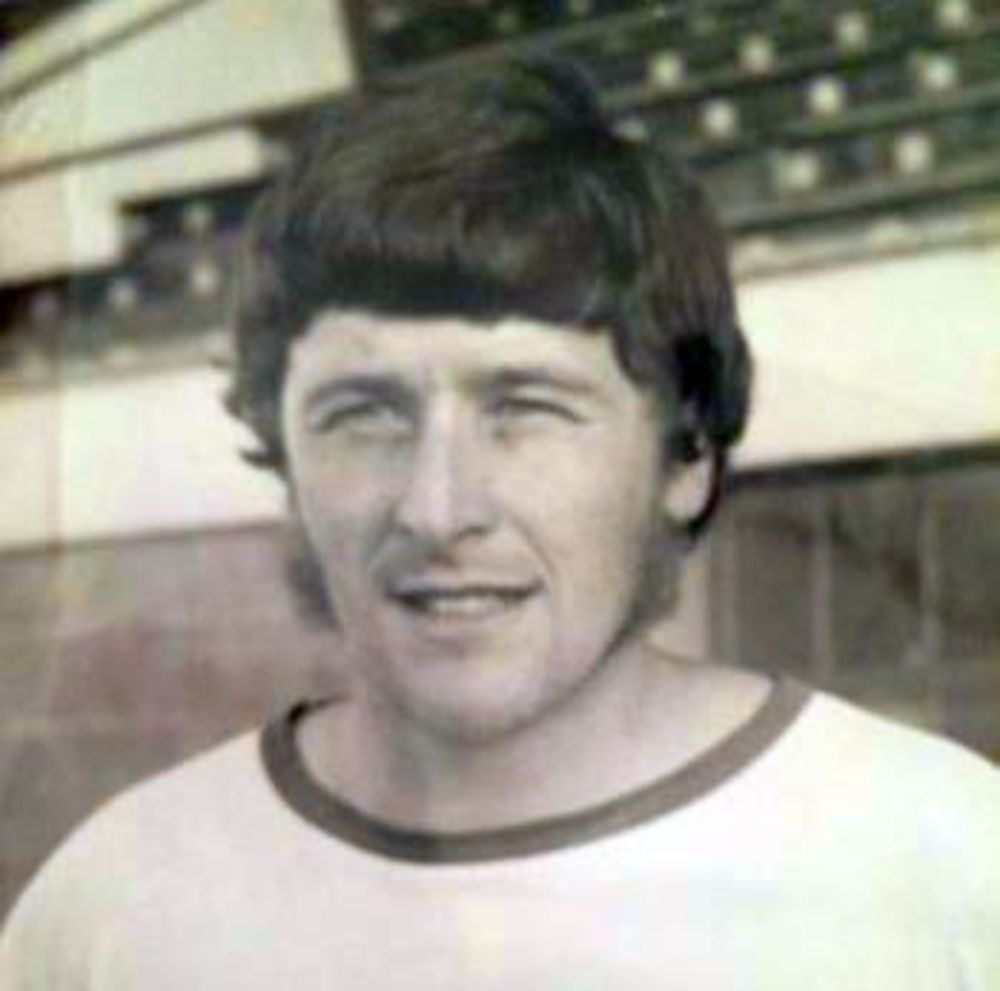
Stuart Housley
Stuart Housley was a tricky winger who was born in Doncaster but spent the majority of his playing career in the West Country.
However, he started out with Grimsby Town and went on to make 34 first-team appearances as a Mariner, scoring 3 goals before joining Southern League Yeovil Town for the first in 1969.
He made a total of 383 appearances for Yeovil Town from 1969 to 1976 and then again from 1979 to 1980 and was also part of the backroom staff involved with Yeovil’s glory years of FA Trophy, Conference and League Two success from 2001 until 2005 and the later play-off final success at Wembley in 2013 and the following 2013/14 season in the Championship.
In the 1990s, he served as a youth team manager, a role he held until 2009. In the years following, he worked as the kit-man and video analyst before retiring in 2015.
In 1976, Housley left the Glovers to join another Southern League outfit, Weymouth and had spells with Taunton and also Dorset League side Westland Sports before returning to Yeovil in 1979.
He sadly died of leukemia in August 2021, aged 72.
But no feature on former Taunton Town players would be complete without Tony Payne’s appearing in it.
The phenomenally loyal midfield player spent almost 19 years with Taunton and was later assistant manager.
Apart from making over 800 appearances, he also chipped in with more than 200 goals and, including reserve team games, totalled well over 1,000 games for the Peacocks.

Most clubs are looking for volunteers. Find out more on the button below:
www.PitchingInVolunteers.co.ukAll the news and results in one place.
REGISTER